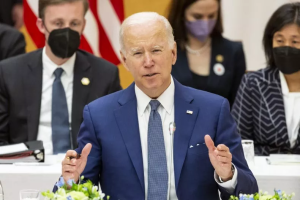The new Canada-Denmark Hans Island border sends a signal to the world, says Prof. Michael Byers
Prof. Michael Byers says that invasion of Ukraine created the “right moment” for the countries to handle the issue of dividing Hans Island between Canada and Denmark: “there’s no significance of the border, except the signal it sends to the world that we can resolve our disputes in a friendly way.”
Check out these new Political Science books featured by the Faculty of Arts
Prof. Kenneth Carty’s The Government Party, Prof. Antje Ellerman’s The Comparative Politics of Immigration, and Prof. Lisa Sundstrom’s Bringing Global Governance Home are three of the Faculty of Arts’ selection of new books by UBC professors.
Prof. Xiaojun Li’s new book Fragmenting Globalization
In their new book Fragmenting Globalization: The Politics of Preferential Trade Liberalization in China and the United States, Profs. Xiaojun Li and Ka Zeng shed light on the influence of global supply chain integration on domestic and international trade policy, as well as support for preferential trade liberalization.
Surrey Mayor Doug McCallum’s name recognition stands out despite his legal troubles, says Prof. Gerald Baier
McCallum delivered on his two major promises of the 2018 campaign, Baier said, which is to bring in a municipal police force and push for a Surrey SkyTrain over light trail transit.
Prof. Lisa Sundstrom notes the impact of “ordinary Russians” in Russia’s invasion of Ukraine
Though she doesn’t blame Russian citizens for not expressing their discontent, Prof. Sundstrom is also coming to understand that the common Russians have continued to support the Russian regime and its actions despite alternative information sources available.
Scope Conditions Episode 2.9: Israeli Partisan Polarization and Animosity with PhD Candidate Chagai Weiss
In this episode of Scope Conditions, PhD Candidate Chagai Weiss talks about polarization in nations outside the United States, exploiting naturally occurring features of Israeli politics, and the limits of using surveys to learn about the effects of elite behavior and institutions.
Postdoctoral fellow Chris Tenove weighs in on incivility experienced by women and racialized political candidates
Commenting on the influence of online abuse specifically, Chris Tenove notes that social media has become a “billboard where you post stuff and walk away,” but still leave a mental toll on candidates, especially women and racialized individuals.
Prof. Paul Quirk comments on President Biden’s damaging “gaffes”
Prof. Quirk notes that US President Joe Biden’s gaffes often leave observers wondering “why, despite his generally good strategic judgment, he sometimes blurts out immediate reactions on matters that call for careful consideration.”
PhD Candidate Martina Zago receives SSHRC funding for project investigating historical European definitions of “civilization”
Martina’s dissertation explores European debates over civilization, barbarism, and savagery in relation to extra-European states and peoples during the age of ‘modern Orientalism,’ 1798-1945. She argues some of the most interesting meaning-makers in this context were visual artists who took to heart the task of defining and contesting the boundaries of what was then considered civilized, barbarous, and savage.
Prof. Jenny Peterson awarded funding for Intergenerational Connections & Futures for Afghan Scholars Program
Part of the $1.096 million dollar grant from the International Development Research Centre will go towards connecting Afghan students with Afghan scholars and activists to discuss possible ‘pathways’ for a socio-politically forward looking Afghanistan through Dr. Jenny Peterson’s “Intergenerational Connections and Futures” project.









